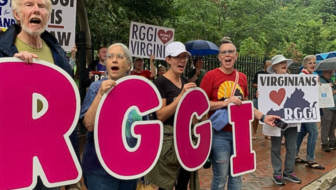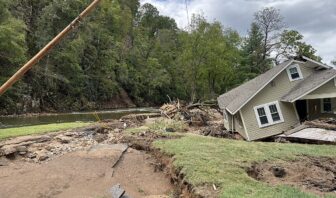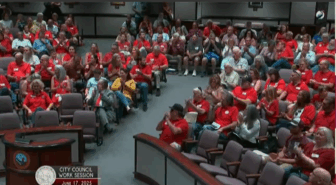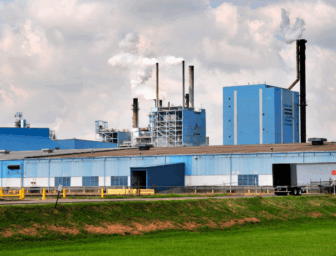Groups Slam MEA Process for Public Input on Fracked-Gas Plans as “Broken”
BALTIMORE, MD — Today, dozens of concerned Maryland residents rallied to protest Governor Hogan’s plans to “kick-start” fracked-gas infrastructure in Maryland. The rally took place just before the Maryland Energy Administration (MEA) held its fourth and final public meeting on Hogan’s plan to spend $30 million in state funds on expanding fracked-gas infrastructure across the state.
The coalition rallied before going inside to make public comments. They also delivered a letter signed by five advocacy organizations opposing Hogan’s gas plans and a letter of grievances about the MEA process, saying they were “deeply frustrated” with how the process was handled, as well as a petition signed by more than 300 residents urging the administration not to spend state money on new fracked-gas infrastructure.
Patrick Grenter, Associate Director for Sierra Club’s Beyond Dirty Fuels Campaign, stated: “Maryland’s own climate change website says that ‘Maryland is among the states most vulnerable to climate change.’ Given this, why would the state move forward with plans to invest millions in gas infrastructure? Marylanders don’t want this frack-fueled plan, which would lock us into decades of fossil fuel infrastructure while we’re in a climate crisis. Any investment in new fossil fuel infrastructure is incompatible with the State’s public commitment to fighting accelerated climate disruption.”
Months after Governor Larry Hogan signed a statewide fracking ban in 2017, he announced his intention to “kick-start” a fracked-gas expansion across Maryland. The Governor has launched his fracked-gas expansion even as scientists confirm that gas is essentially as harmful to the climate as coal. Despite this, he wants to spend $30 million in state money on this new fracked-gas infrastructure.
As part of AltaGas’s acquisition of local gas supplier Washington Gas, Hogan negotiated a settlement wherein AltaGas would place $30 million into the state’s Strategic Energy Investment Fund, which the state would then spend to assist gas companies in the construction of more fracked-gas pipelines all across Maryland. The agreement also opens the door for AltaGas passing $70 million onto ratepayers to do the same.
“This plan is in direct contrast to one of SEIF’s main missions, which is to ‘address global climate change concerns,’” said Anthony Field, Maryland Grassroots Coordinator at the Chesapeake Climate Action Network. “Investing in fracked-gas is a bridge to climate disaster. If Hogan truly wanted to address climate change, he would focus on cleaning up our existing leaky pipelines as we move towards clean and sustainable sources of energy such as wind and solar.”
Under the terms of the agreement, “MEA shall use such funds in its discretion for the purpose of promoting the expansion of natural gas infrastructure . . . in Maryland.” Under Senate Bill 52, Hogan’s Maryland Energy Administration is required to develop a plan for spending the $30 million in state funds. In developing this plan, MEA was required to hold at least four separate public meetings across the state by the end of the year. More than 70 concerned Marylanders have turned out to the first three meetings, despite poor notice and planning.
The meetings were inaccessible, poorly advertised, and lacked transparency, environmental organizations argued in a letter delivered to MEA today. The letter continues:
“The process, as it is now, is broken. It seems geared at checking a box rather than giving the public a meaningful opportunity to weigh in and help inform MEA’s future plans. The meetings provided further evidence that this Administration is bent on expanding gas infrastructure, no matter the effect on the climate and no matter what the public wants.”
Annie Bristow of Frack-Free Frostburg stated: “The entire lifecycle of fracked gas must be considered from a public health perspective – from air and water pollution at extraction to end use air pollution in homes and businesses. Expansion of fracked gas pipelines in Maryland would increase risks to the health and safety of Marylanders, financially incentivize fracking of our neighbors in Pennsylvania and West Virginia, and fail to address the public health threat from climate change.”
Ruth Alice White stated: “Extending the use of gas in Maryland is counter to the Maryland’s commitment to move dramatically reduce Maryland Greenhouse gases, totally counter to the Greenhouse Gas Reduction Act’s purpose. We can’t be implementing new gas infrastructure designed to last 30 years or more when we are striking desperately to reduce emissions. We know fracked gas leaks at every stage in extraction and piping. The gas is methane which is 84 times worse than carbon dioxide as a greenhouse gas over a 20 year period. We need to move rapidly to clean and renewable wind and solar.”
Tracy Cannon of the Eastern Panhandle Green Coalition stated: “Citizen and environmental groups in the Eastern Panhandle of WV were thrilled to learn that Maryland’s Board of Public Works blocked the Potomac Pipeline, which would have carried fracked gas to polluting industrial development in our counties. We find it contradictory that Maryland would now support spending $30 million on fracked-gas infrastructure. We would like to look to Maryland as an example of what a green state can be. This is disappointing.”
MEA has made access to these meetings extraordinarily difficult, giving the public very little notice, scheduling them during the workweek, even holding one at a location that required attendees to apply for a parking pass 48 hours in advance. Despite this, more than 70 concerned Marylanders have spoken out against Hogan’s fracked-gas expansion plans in person and more than 300 more have signed a letter in opposition.
CONTACT:
Denise Robbins, Communications Director, denise@chesapeakeclimate.org, 240-630-1889
Anthony Field, Maryland Grassroots Coordinator, anthony@chesapeakeclimate.org, 301-664-4068
###
The Chesapeake Climate Action Network is the oldest and largest grassroots organization dedicated exclusively to raising awareness about the impacts and solutions associated with global warming in the Chesapeake Bay region. For 16 years, CCAN has been at the center of the fight for clean energy and wise climate policy in Maryland, Virginia, and Washington, D.C. For more information, visit www.chesapeakeclimate.org





